The Thyroid-Friendly Diet: Foods That Help Hormone Health
Charu Sharma | Sep 02, 2025, 19:30 IST
( Image credit : Timeslife )
Thyroid gland, though really small, is in charge of your energy, mood, and metabolism. Medication, without a doubt, is necessary; however, diet can go a long way in helping the hormone balance. Here are five vegetarian thyroid-friendly foods that facilitate hormone balance, along with the brief explanation of their function, the easiest ways to add them to your diet, and the list of foods to avoid: iodized salt and dairy, selenium-rich nuts and seeds, probiotics, leafy greens, and antioxidant fruits.
Although the thyroid is tiny, it is the one that keeps you healthy. This neck's butterfly-shaped gland is the body's thermostat and regulates metabolism, body temperature, energy levels, mood, skin, and menstrual health as well. In case its functioning is improper (hypothyroidism or hyperthyroidism), life becomes very hard. Drugs and medical supervision are the main cornerstones in the treatment of thyroid diseases; however, lifestyle, in particular, diet, makes a very big difference. What you eat can give the hormone system the support it needs, or it can aggravate the symptoms. To name only a few nutrients that the body needs for thyroid function, there are iodine, selenium, zinc, and antioxidants. In this article , we have covered the five vegetarian thyroid-friendly foods that science supports, the reason for their help, the easy ways of their inclusion in daily meals, as well as the avoidance.
1. Iodized Salt & Dairy: Everyday Iodine Boosters
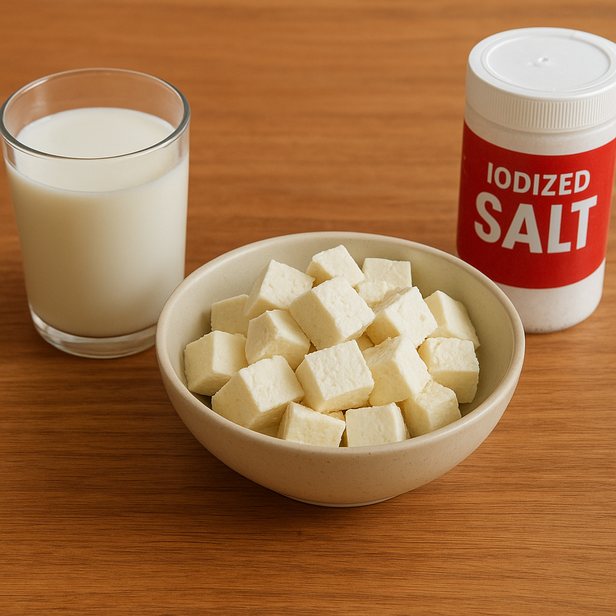
Iodine is the main source of the thyroid hormones. The gland can not produce thyroxine (T4) and triiodothyronine (T3) if it is not provided with sufficient iodine, which eventually causes lethargy, gaining extra pounds, and goiter. To deal with iodine deficiency, the Indian government introduced iodized salt; however, the studies indicate that there are still some mild deficits, particularly among females. Food like milk, paneer, and curd are also good natural sources of iodine. Cook with iodized salt but in small quantities to manage your blood pressure. A glass of milk or a bowl of curd every day is the easiest way to get enough iodine. You can add paneer or low-fat cheese to your curries, salads, or wraps.Iodine in excess can be damaging to your body. Consume it in moderation and do not take extra supplements.
2. Brazil Nuts & Seeds: Selenium Powerhouses
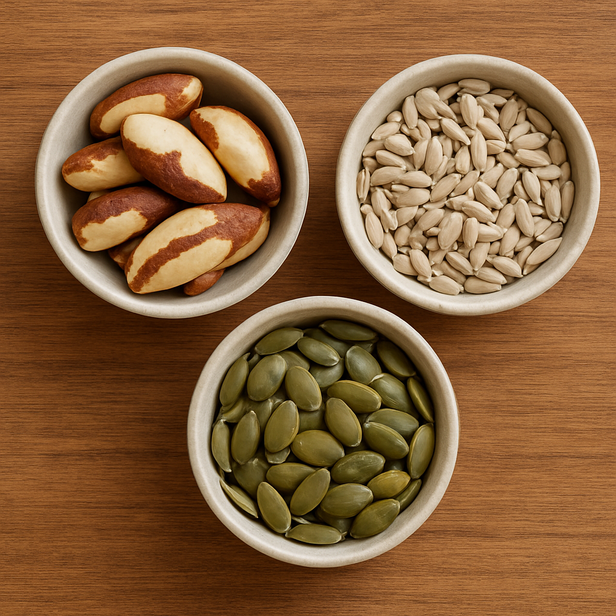
If by some chance your thyroid is not functioning properly, selenium is the best option to convert the inactive thyroxine (T4) into triiodothyronine (T3) that is the hormone that your cells actually use. Besides, it helps in lowering the levels of the thyroid antibodies concentration in auto immune diseases like Hashimoto's. Certainly, Brazil nuts are the most potent source, however, a variety of seeds such as sunflower seeds, pumpkin seeds, and flaxseeds not only provide selenium but also zinc that is equally vital for thyroid health. 2-3 Brazil nuts daily is just the right amount of snack to have. A great way to incorporate sunflower or pumpkin seeds into your diet is to add them to your morning smoothie or sprinkle over your salads. You can also eat them in the following ways: Mix flaxseeds or chia seeds into yogurt, oats, or parathas.To avoid selenium toxicity, do not consume more than 2–3 Brazil nuts per day.
3. Yogurt & Fermented Foods: Gut–Thyroid Connection
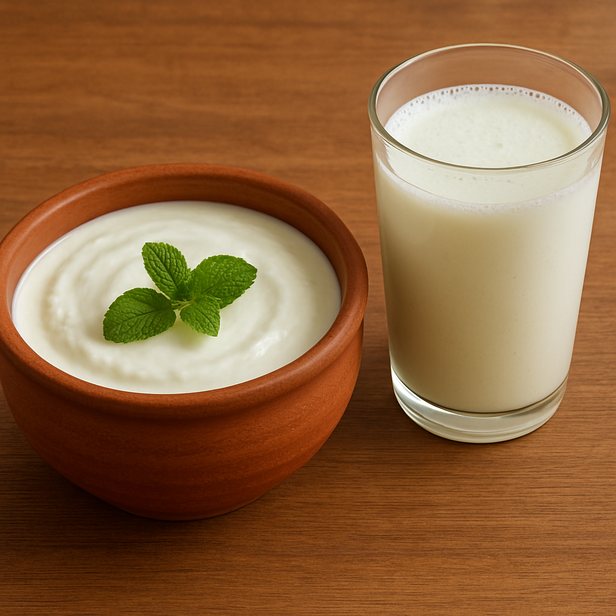
Approximately 20% of thyroid hormone conversion is carried out in the digestive tract. So if your intestinal health is declined, your thyroid will also be out of order. Probiotics in yogurt, buttermilk, kanji, and fermented batter (idli/dosa) not only balance gut bacteria but they also improve the absorption of nutrients like iodine and zinc and at the same time decrease the inflammation. Besides, yogurt is also a natural source of iodine, so it is "a double win". So, have a bowl of plain yogurt with fruits or flaxseeds. To cool off in summer, have a glass of chaas(spiced buttermilk) with your lunch. Just Get Used To Traditional Fermented Foods: Idli, Dosa, Dhokla, And Kanji. Choose plain yogurt. The abundance of sugar in your diet can contribute to the development of inflammation.
4. Spinach & Leafy Greens: Iron and Magnesium Support
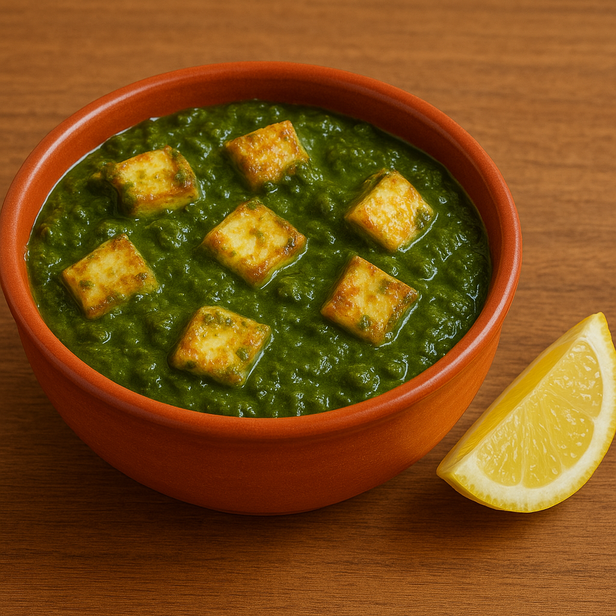
One of the major causes of thyroid disorders is anemia due to iron deficiency along with other factors. Iron Is needed for thyroid peroxidase, the enzyme that synthesizes the thyroid hormones. Spinach, moringa leaves, fenugreek leaves and kale are full of iron, magnesium and folate - the minerals that support thyroid health. You can add spinach to dal, parathas or smoothies. Make palak-paneer and moringa leaf stir-fry part of your diet meal plan; eating them twice a week will do your thyroid good. Eat iron-rich greens together with foods rich in vitamin C (like lemon or amla) so that the iron could be absorbed more efficiently. Uncooked spinach and kale have goitrogens (thyroid-interfering compounds). Since the goitrogens are neutralized by cooking, you should consume them after light sauté or steam.
5. Berries & Indian Antioxidant Fruits: Protecting the Gland
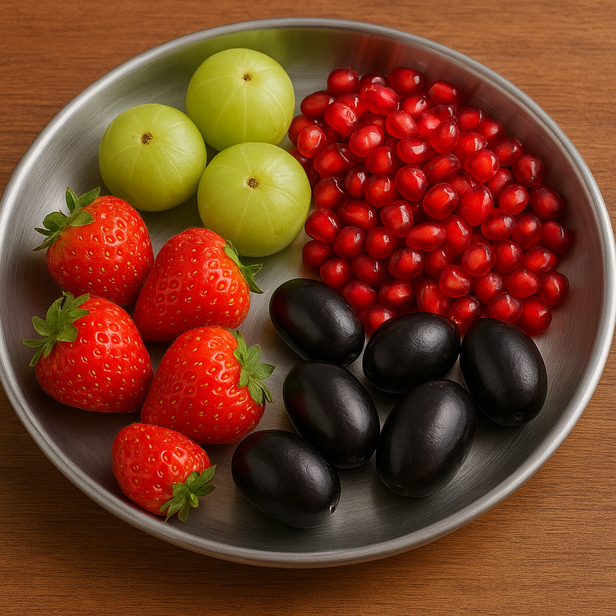
The oxidative stress injures thyroid cells and leads to the aggravation of autoimmunity. Antioxidants are the ones to combat this harm. On one hand, blueberries and strawberries are in the limelight all along, but on the other hand, Indian superfruits such as amla, pomegranate, and jamun are not less potent. These are loaded with vitamin C, anthocyanins, and polyphenols which not only improve immunity but also provide the body with the required amount of energy. Take the fresh amla juice every morning. Wear the seeds of a pomegranate to your salads and raitas. Eat seasonal fruits like jamun during their harvest period.Sugary fruit drinks raise blood sugar levels quickly, so consuming whole fruits is a better option.
So in conclusion : Thyroid health is not only about pills or visits to the doctor, it is about the small decisions you make every day. When you consume iodized salt and dairy products, selenium-rich nuts and seeds, probiotic yogurt and fermented foods, leafy greens, and antioxidant-packed fruits, you are providing your thyroid with the necessary nutrients for its easy functioning. The point is not to strictly adhere to a "thyroid diet" but to eat consciously, mixing the Indian staples you are used to with the scientifically backed foods. Through these changes, your thyroid, as well as your energy, mood, and metabolism, can become balanced at their healthiest.
FAQs (Frequently Asked Questions) :
1. Iodized Salt & Dairy: Everyday Iodine Boosters

Iodized products
( Image credit : Times Life Bureau )
Iodine is the main source of the thyroid hormones. The gland can not produce thyroxine (T4) and triiodothyronine (T3) if it is not provided with sufficient iodine, which eventually causes lethargy, gaining extra pounds, and goiter. To deal with iodine deficiency, the Indian government introduced iodized salt; however, the studies indicate that there are still some mild deficits, particularly among females. Food like milk, paneer, and curd are also good natural sources of iodine. Cook with iodized salt but in small quantities to manage your blood pressure. A glass of milk or a bowl of curd every day is the easiest way to get enough iodine. You can add paneer or low-fat cheese to your curries, salads, or wraps.Iodine in excess can be damaging to your body. Consume it in moderation and do not take extra supplements.
2. Brazil Nuts & Seeds: Selenium Powerhouses

Mix of nuts
( Image credit : Times Life Bureau )
If by some chance your thyroid is not functioning properly, selenium is the best option to convert the inactive thyroxine (T4) into triiodothyronine (T3) that is the hormone that your cells actually use. Besides, it helps in lowering the levels of the thyroid antibodies concentration in auto immune diseases like Hashimoto's. Certainly, Brazil nuts are the most potent source, however, a variety of seeds such as sunflower seeds, pumpkin seeds, and flaxseeds not only provide selenium but also zinc that is equally vital for thyroid health. 2-3 Brazil nuts daily is just the right amount of snack to have. A great way to incorporate sunflower or pumpkin seeds into your diet is to add them to your morning smoothie or sprinkle over your salads. You can also eat them in the following ways: Mix flaxseeds or chia seeds into yogurt, oats, or parathas.To avoid selenium toxicity, do not consume more than 2–3 Brazil nuts per day.
3. Yogurt & Fermented Foods: Gut–Thyroid Connection

Yoghurt and Chaas
( Image credit : Times Life Bureau )
Approximately 20% of thyroid hormone conversion is carried out in the digestive tract. So if your intestinal health is declined, your thyroid will also be out of order. Probiotics in yogurt, buttermilk, kanji, and fermented batter (idli/dosa) not only balance gut bacteria but they also improve the absorption of nutrients like iodine and zinc and at the same time decrease the inflammation. Besides, yogurt is also a natural source of iodine, so it is "a double win". So, have a bowl of plain yogurt with fruits or flaxseeds. To cool off in summer, have a glass of chaas(spiced buttermilk) with your lunch. Just Get Used To Traditional Fermented Foods: Idli, Dosa, Dhokla, And Kanji. Choose plain yogurt. The abundance of sugar in your diet can contribute to the development of inflammation.
4. Spinach & Leafy Greens: Iron and Magnesium Support

Palak paneer
( Image credit : Times Life Bureau )
One of the major causes of thyroid disorders is anemia due to iron deficiency along with other factors. Iron Is needed for thyroid peroxidase, the enzyme that synthesizes the thyroid hormones. Spinach, moringa leaves, fenugreek leaves and kale are full of iron, magnesium and folate - the minerals that support thyroid health. You can add spinach to dal, parathas or smoothies. Make palak-paneer and moringa leaf stir-fry part of your diet meal plan; eating them twice a week will do your thyroid good. Eat iron-rich greens together with foods rich in vitamin C (like lemon or amla) so that the iron could be absorbed more efficiently. Uncooked spinach and kale have goitrogens (thyroid-interfering compounds). Since the goitrogens are neutralized by cooking, you should consume them after light sauté or steam.
5. Berries & Indian Antioxidant Fruits: Protecting the Gland

Antioxidant fruits
( Image credit : Times Life Bureau )
The oxidative stress injures thyroid cells and leads to the aggravation of autoimmunity. Antioxidants are the ones to combat this harm. On one hand, blueberries and strawberries are in the limelight all along, but on the other hand, Indian superfruits such as amla, pomegranate, and jamun are not less potent. These are loaded with vitamin C, anthocyanins, and polyphenols which not only improve immunity but also provide the body with the required amount of energy. Take the fresh amla juice every morning. Wear the seeds of a pomegranate to your salads and raitas. Eat seasonal fruits like jamun during their harvest period.Sugary fruit drinks raise blood sugar levels quickly, so consuming whole fruits is a better option.
So in conclusion : Thyroid health is not only about pills or visits to the doctor, it is about the small decisions you make every day. When you consume iodized salt and dairy products, selenium-rich nuts and seeds, probiotic yogurt and fermented foods, leafy greens, and antioxidant-packed fruits, you are providing your thyroid with the necessary nutrients for its easy functioning. The point is not to strictly adhere to a "thyroid diet" but to eat consciously, mixing the Indian staples you are used to with the scientifically backed foods. Through these changes, your thyroid, as well as your energy, mood, and metabolism, can become balanced at their healthiest.
FAQs (Frequently Asked Questions) :
- Can diet alone cure thyroid problems?
No, diet supports thyroid health but cannot replace medical treatment. - How much iodine do we need daily?
Adults need about 150 micrograms of iodine per day. - Do thyroid patients need to avoid dairy completely?
No, moderate dairy intake provides iodine and supports thyroid function. - Are soy products harmful for thyroid health?
Excess soy may interfere with medication; moderate, cooked forms are safe.
